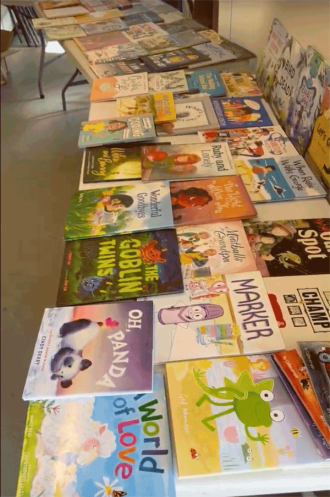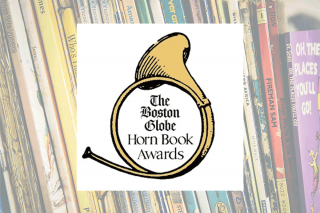In honor of the 50th anniversary of the Children’s Literature Program at Simmons, we caught up with Rodney Fierce ’12MA about what led him to study children’s literature, his work at Sonoma Academy, and his recent experience on the Horn Book Awards Committee.
From Theater to Children’s Literature
Fierce can easily identify the three people who inspired his career path.
“My grandmother, my thesis advisor for my undergraduate degree, and Professor and Graduate Program Director Cathryn Mercier,” says Fierce. “They were the Three Fates helping to spin my future for me.”
As a child, his grandmother took him to see Peter and Wendy on Broadway — the 1904 play written by J.M. Barrie, which Barrie adapted in 1911 into the novel, Peter Pan. “I was already a big reader,” says Fierce. “But [watching that play], I fell in love with the craft of children’s literature.”
As an undergraduate English major who minored in theater and dance, Fierce’s senior thesis consisted of a revision and staging of Peter and Wendy, including traveling to England and Scotland to research set design. At the end of the huge undertaking, his thesis advisor noted his passion for children’s literature.
“She told me I should get a master’s degree in children’s literature,” recalls Fierce. “I said, ‘those exist?’ She told me to look at Simmons.”
At Simmons, he met Professor Mercier. “It was a combination of falling in love and hero worship,” he recalls. “You know those moments when everything clicks, and you know that someone is going to change your life? That’s what I felt with Cathie. I couldn’t have asked for a better friend, mentor, and guide through academia. She believes so fervently in my potential, that I can do the things that I said I wanted to do. [Cathie] changed the way I look at the world. The program changed the way I look at the field of children’s literature and imagine its possibilities.”
Judging the 2024 Horn Book Awards

One of Fierce’s goals was to judge the Horn Book Awards, which he did in 2024, with Mercier and Katrina Hedeen Eftekhari, a former editor at The Horn Book and children's librarian at the Medfield Public Library in Medfield, Massachusetts.
“We worked so well together!” says Fierce. “It wasn’t that we always agreed, but we had such rich conversations. They valued my input. It was an amazing learning opportunity.” It also marked a new stage in his relationship with his mentor. “To work with Cathie as a peer, instead of student and teacher, was a gift.”
That said, the task was considerable: the trio of judges read 1,700 books for the award.
“As a teacher, books are teaching tools. You’re often divorced from what books can do for children,” says Fierce. “[Judging the Horn Book Awards] meant looking at trends in publishing, determining who these books are for, and which books have increased [diverse] representation. What books are leading us into the future?” His syllabus at Sonoma Academy changed as a result of the books he discovered in the judging process.
While Fierce did see greater representation in the books he read, he notes some trends that threaten to pigeonhole the stories those diverse characters are chosen to tell. “We’re falling into some tropes,” he observed. “I loved The Hate U Give,” he notes of Angie Thomas’ book, which won a Printz Honor in 2018. “But I read a lot of similar books focused on Black kids in the inner city. We need those books, but we also need Jerry Craft’s books about middle-class kids trying to survive high school, in order to get a full picture of [their experience].”
Preparation at Simmons
“The program changed the way I look at the field of children’s literature and imagine its possibilities.”
Reflecting on his time at Simmons, Fierce knows that his studies prepared him for any number of challenges in his career.
“[The Children’s Literature program] prepared me phenomenally as an academic,” he says. “The rigor that Cathie offered prepared me to think deeply and critically, to listen to other people and to debate with integrity, and to take a wide lens to look at the world.”
Further, his peers in the program further expanded his worldview. Growing up, Fierce attended a British Catholic high school for boys. “I came from an environment where women were absent to an environment [at Simmons] run by women,” says Fierce. “It gave me greater empathy and understanding of what women can do for children’s literature.”
He distinctly remembers deconstructing Robert Cormier’s The Chocolate War, a novel that takes place in an all-boys school. “I got to discuss toxic masculinity with a class full of women. It was amazing!”
Teaching at Sonoma Academy
Of his current role at Sonoma Academy — a private, co-ed college preparatory high school in Santa Rosa, California — Fierce says, “I’m a cheerleader, life coach, surrogate parent, and I also teach things. My job is to teach them empathy, so they can go into the world and understand what matters to people and find common ground. Children’s literature is a way to do that, to show the humanity in all of us and make connections with people who may not agree [with our views].”
Further, he’s put thought into the value of meeting kids where they are.
“My husband struggled in school and was made to feel stupid,” Fierce says. “Being married to him is an education in using different strategies to get kids reading, from picturebooks to audiobooks to graphic novels. The goal is to give them the enjoyment of a story, give them access to that world.”
Fierce was naturally gifted at school and an avid reader; at the age of 12, he was undaunted by the works of Charles Dickens. “I was fortunate to have a brain that allowed me to do that,” he says. “Great Expectations is a phenomenal story, but not every kid looks at a 1,000-page book and says, ‘heck yeah, let’s do this thing!’ You have to meet children where they are, or they will turn off [their interest] and it will be hard to get them back.”
He notes that the distractions offered by myriad modes of technology put that focused attention at risk. “It’s more important than ever to demonstrate why reading matters, and why it matters in education.”
Advice for Children’s Literature Students
For individuals considering studying children’s literature, Fierce encourages them to get in touch with professors and current students to explore potential career paths.
“Consider what you want to do with your degree,” he says. “Do you want to write and be published? Teach? Work in the publishing industry? Be a librarian? I was in classes with people doing all of the above, so I got to see all of those paths and figure out what best fits me. Use your time in the program to make those connections with people, so you can figure out the path for you.”
Rodney Fierce’s Recommended Reading
- Blood at the Root by LaDarrion Williams
- Masquerade by O.O. Sangoyomi
- The Blood Years by Elana K. Arnold
- Rez Ball by Byron Graves
- The Mona Lisa Vanishes by Nicholas Day
- Children of Blood and Bone by Tomi Adeyemi
- Max in the House of Spies by Adam Gidwitz

